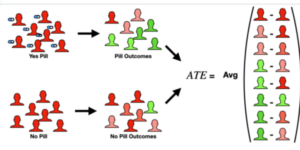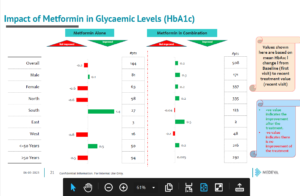As healthcare providers strive to provide the best possible care to their patients, understanding the effects of different treatments becomes increasingly important. This is especially true for data in longitudinal nature, where patients are followed over time and treatment effects may vary depending on various factors. At Medeva, we build treatment effect models that assist clinicians in estimating the effects of different treatments, using advanced causal inference techniques to provide accurate estimates while controlling for bias, confounding, and other sources of error.
Our pipeline for estimating treatment effects uses a range of matching techniques, including propensity scoring and inverse probability target weight methods, to match cases in terms of various covariates and provide stable treatment effects at the population level. We also apply regression-based approaches, such as double regression and meta learners like S learner, T learner, and X learner, to estimate treatment effects at the individual level (ITE).

As a standard practice, our backend treatment effect algorithms work to provide both population level and individual level treatment effects when longitudinal data is observed. This allows clinicians to gain a more comprehensive understanding of the effects of different treatments on their patients over time, and to make more informed decisions about which treatments to pursue.
Overall, our treatment effect models provide a valuable tool for healthcare providers looking to optimize patient care and outcomes. By leveraging advanced causal inference techniques and a range of matching, uplift , meta learners and regression-based approaches, Medeva is helping clinicians better understand the complex and dynamic nature of treatment effects in longitudinal data.




